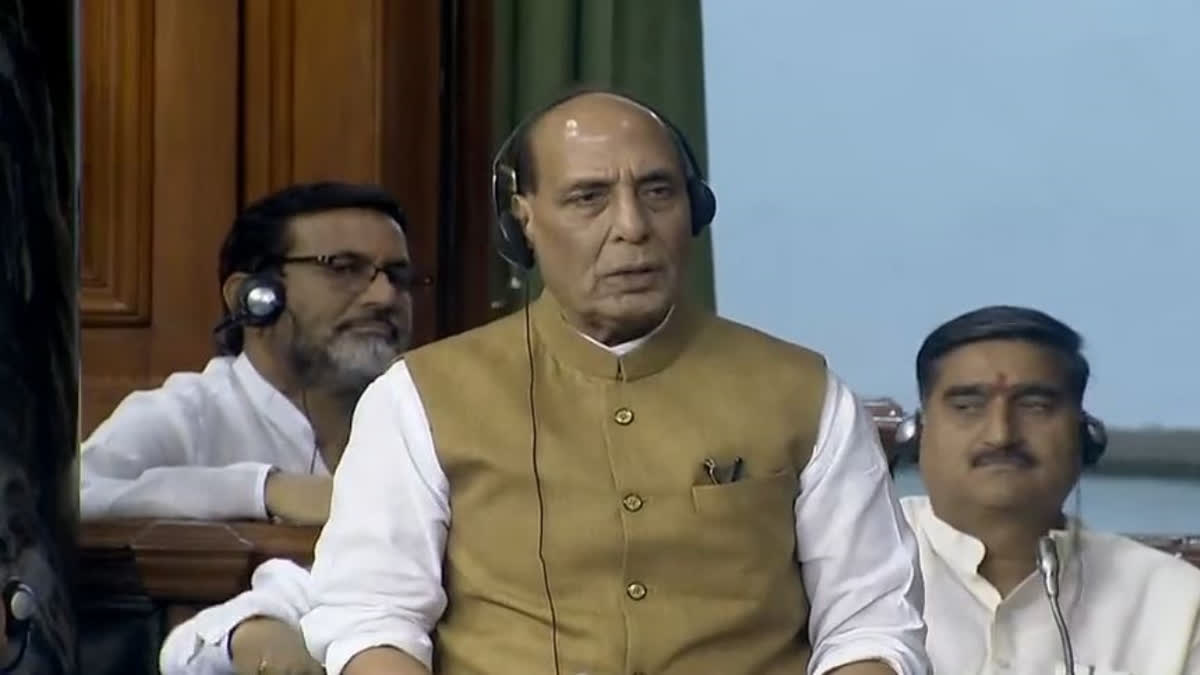New Delhi: Inter-Services Organisations (Command, Control and Discipline) Bill, 2023, was tabled in Lok Sabha on Friday.
The Bill is designed to empower designated military commanders to take charge of soldiers and enforce discipline, regardless of the service they belong to. Discussing on the Bill, Union Defence Minister Rajnath Singh said the government's prime motive is to ensure foolproof security of the country by protecting the nation from surface, air and waterways and the Bill is designed to establish integrated or joint commands, where all the manpower and assets will be under the operational control of a single three-star general of the Indian Army, Navy and IAF (Indian Air Force).
"Inter-Services Organisations (Command, Control and Discipline) Bill, 2023 is a well thought out effort of the government to meet future challenges. The government fully realises the fact that discipline is the mainstay of three forces and a cohesion among three units are a must for future warfare," Singh said. He further said implementation of the Bill will unify the three forces and act as morale booster for all units.
"We have taken consideration of all aspects of 21st century warfare. This structural change will empower commanding officers or heads of Army divisions to take quick decisions regarding forces mobilisation in case of emergency," Singh added.
-
Introducing the 'Inter-Services Organisations (Command, Control and Discipline) Bill, 2023' in Lok Sabha. https://t.co/tOKBdim50G
— Rajnath Singh (@rajnathsingh) August 4, 2023 " class="align-text-top noRightClick twitterSection" data="
">Introducing the 'Inter-Services Organisations (Command, Control and Discipline) Bill, 2023' in Lok Sabha. https://t.co/tOKBdim50G
— Rajnath Singh (@rajnathsingh) August 4, 2023Introducing the 'Inter-Services Organisations (Command, Control and Discipline) Bill, 2023' in Lok Sabha. https://t.co/tOKBdim50G
— Rajnath Singh (@rajnathsingh) August 4, 2023
What are the key provisions of the Bill?
The system is likely to include five joint services commands - western, eastern, northern, maritime, and air defense. The central government may constitute an Inter-services Organisation, which may include a Joint Services Command.
It will empower the Commander-in-Chief/the Officer-in Command of Inter-Services Organisations to maintain discipline and ensure proper discharge of duties of all the personnel from the army, navy and IAF serving under his command. The Commander-in-Chief or the Officer-in-Command of an Inter-services Organisation shall be the head of such Inter-services Organisation.
What is the current structure of Indian Armed forces?
At present, soldiers from their respective services are governed by different Acts of Parliament. They are the Navy Act of 1957, the Air Force Act of 1950, and the Army Act of 1950.
In a current joint services setup, an army soldier commanded by a navy officer would have to be sent back to his parent unit for any disciplinary proceedings. The navy officer does not have administrative powers over the said soldier. The Indian armed forces currently have 17 commands. There are seven commands each of the Army and the Air Force. The Navy has three commands.
Each command is headed by a 4-star rank military officer. There is one joint command in Andaman and Nicobar Islands which is the first Tri-Service theatre command of the Indian Armed Forces, based at Port Blair in Andaman and Nicobar Islands of India. The other tri-service command, the Strategic Forces Command (SFC), looks after the delivery and operational control of the country’s nuclear assets.



